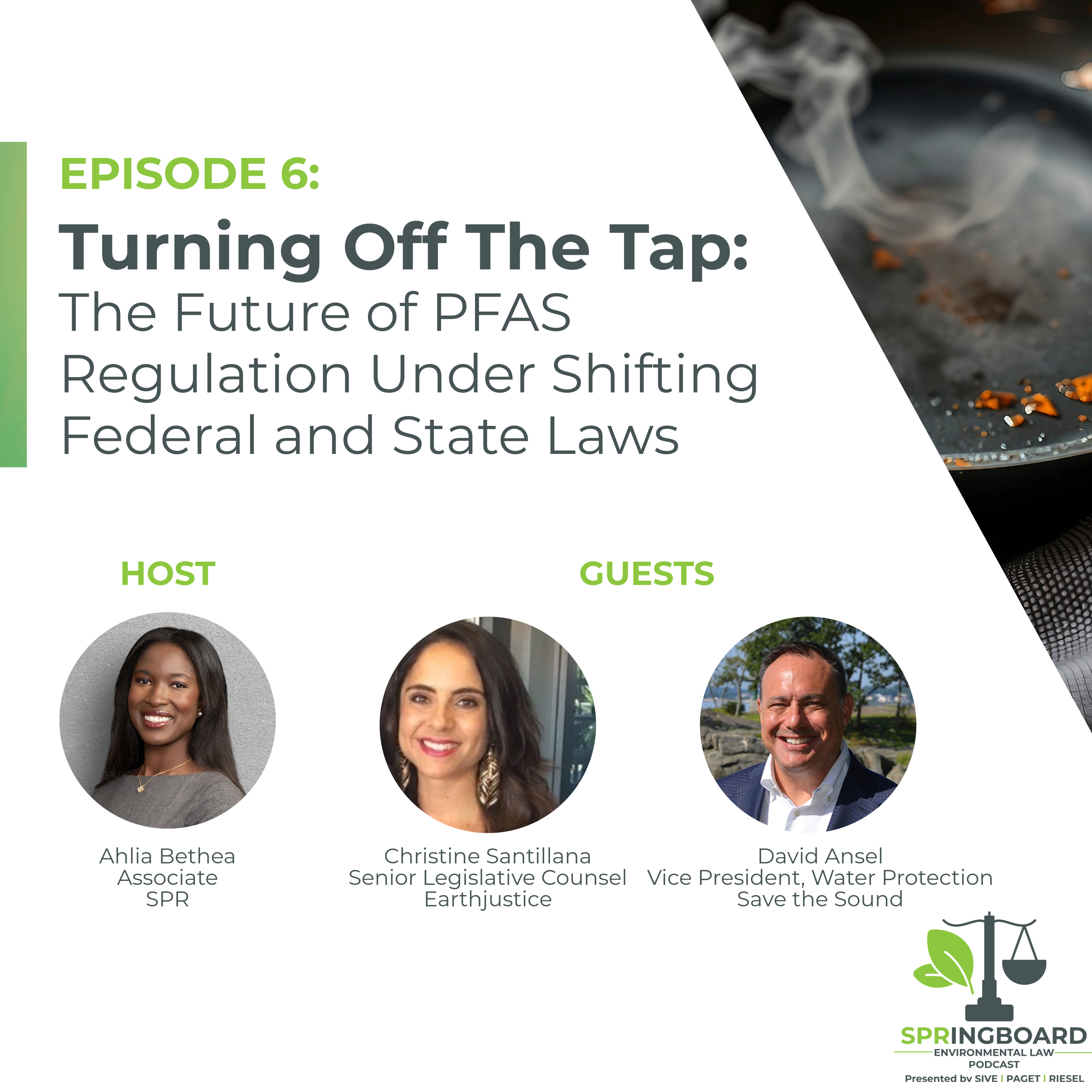SPRingBoard Environmental Law Podcast

SPRingBoard Environmental Law Podcast
Podcast Description
Hosted by Sive, Paget & Riesel, New York's preeminent environmental law firm for over 60 years, SPRingBoard Environmental Law Podcast is a conversational and interview-based show centralized on a wide spectrum of environmental law-based topics. Guests will include SPR attorneys, topic experts, consultants, activists, professors, environmental lawyers and more.
Podcast Insights
Content Themes
The podcast explores a wide array of environmental law topics including climate justice, sustainability in construction, and regulatory impacts under different governmental administrations. Specific episodes address subjects like NYC’s Local Law 97, the complexities of climate gentrification, and the anticipated changes in environmental policies under political shifts.

Hosted by Sive, Paget & Riesel, New York’s preeminent environmental law firm for over 60 years, SPRingBoard Environmental Law Podcast is a conversational and interview-based show centralized on a wide spectrum of environmental law-based topics. Guests will include SPR attorneys, topic experts, consultants, activists, professors, environmental lawyers and more.
Summary
In the latest episode of the SPRingBoard Environmental Law Podcast, host Ahlia Bethea guides us through a discussion on one of the most pervasive and daunting environmental threats: PFAS, the so-called “forever chemicals.”
As scientific evidence mounts and public concern grows, PFAS contamination has become a flashpoint for legal, regulatory, and equity debates across the country. Recent federal actions, such as the EPA’s first-ever national drinking water limits and subsequent rollbacks, have sparked intense discussion about the future of regulation and the role of states in filling federal gaps.
To dissect these issues, Ahlia is joined by Christine Santillana, Senior Legislative Counsel at Earthjustice, and David Ansel, Vice President of Water Protection at Save the Sound. In this episode, they explore the science behind PFAS toxicity and persistence, the evolving legal frameworks at both federal and state levels, and the practical challenges of enforcement, monitoring, and remediation. What does it mean to regulate PFAS as a class rather than one chemical at a time? How can states like New York and California lead the way? What are the implications for environmental justice, public health, and community advocacy as the regulatory landscape continues to shift?
Production support for this episode was provided by Charlotte Hawes, Legal Marketing Assistant at SPR.
PFAS-Free NY Website Link: https://pfasfreeny.org/
Takeaways
- PFAS are everywhere: These man-made chemicals are found in countless products (nonstick pans, waterproof clothing, firefighting foam, food packaging, dental floss, etc.) and persist in the environment and human bodies.
- Health risks are potentially serious: PFAS exposure is linked to cancer, immune system effects, and other chronic health problems.
- EPA action is historic but limited: The EPA’s 2024 designation of PFOA and PFOS as hazardous substances under CERCLA is a milestone, allowing for polluter accountability and cleanup, but only covers two chemicals out of hundreds in use.
- Regulation struggles to keep up: Industry continues to introduce new PFAS variants, making regulation a “whack-a-mole” challenge. Advocates push for regulating PFAS as a class, not just individual compounds.
- State leadership is crucial: States like New York, Connecticut, Minnesota, Maine, and California are passing laws to phase out PFAS in consumer products.
- Industry pushback is strong: Trade associations and manufacturers lobby against PFAS regulations, for example there has been recent industry pushback in California to proposed regulation of PFAS in cookware.
- Monitoring and infrastructure investment needed: Effective PFAS response requires investment in water testing and wastewater treatment upgrades.
- Environmental justice is central: PFAS contamination disproportionately affects low-income, rural, and communities of color. Targeted funding, community engagement, and policy integration are needed.
- Federal rollbacks pose risks: Recent EPA moves to rescind or delay drinking water limits for certain PFAS threaten public health, especially in vulnerable communities.
- Local action matters: Communities can pass local laws banning sewage sludge on farmland and set up independent water testing, showing that local advocacy can drive change even when federal or state action lags.
Disclaimer: The content of this podcast, and its supplemental material, is for informational purposes only and should not be considered legal advice. The views and opinions expressed in this program are those of the speakers in their individual capacities and do not necessarily reflect the views or opinions of SPR and/or any of the clients they represent.

Disclaimer
This podcast’s information is provided for general reference and was obtained from publicly accessible sources. The Podcast Collaborative neither produces nor verifies the content, accuracy, or suitability of this podcast. Views and opinions belong solely to the podcast creators and guests.
For a complete disclaimer, please see our Full Disclaimer on the archive page. The Podcast Collaborative bears no responsibility for the podcast’s themes, language, or overall content. Listener discretion is advised. Read our Terms of Use and Privacy Policy for more details.